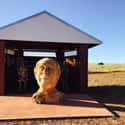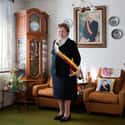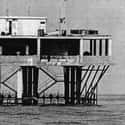-
(#9) The Kingdom Of Elleore: The Island Vacation Micronation
The uninhabited island of Elleore off the east coast of Denmark was purchased by a group of progressive schoolteachers (called "The Immortals") in the 1940s. The group first used the tiny island as a summer retreat for their students, during which time they half-jokingly proclaimed its independence in a loving parody of Denmark’s traditionally splintered government structure.
Over the years, Elleore has developed several unusual traditions of its own, including inexplicable bans on canned sardines and the novel Robinson Crusoe, as well as the use of “Elleore Standard Time,” which runs 12 minutes behind Danish time. The most popular Elleore tradition is Elleuge, or “Elle-week.” This is the one week of the year when Elleore is actually habited, as hordes of citizens gather on the island to elect a new ruler, or vote to keep the current one. They also enjoy picnics, camping, and a rousing game of “cracket” – a sport of their own invention. The Elleorians, as they prefer to be called, like to think of this ritual as returning home after a 51-week holiday abroad.
-
(#8) Principality of Hutt River
- Australia
One of the most well-known micronations, the Principality of Hutt River, was established in 1970 by a disgruntled Australian farmer named Leonard Casley. The nation was founded in response to harsh restrictions on the amount of wheat that farmers in Western Australia were allowed to sell. Casley fought the wheat quotas in court, but when his efforts failed, he turned to an obscure law that allowed British colonies to secede in extreme circumstances. Casley soon declared his 29-square-mile farmland to be his own independent nation: The Principality of Hutt River.
Today, Casley continues to rule what is sometimes called “the second largest country on the continent,” issuing collectibles and conferring citizenship for a small fee. Although the Australian government has never acknowledged the Principality of Hutt River, the tiny nation recently had its closest brush with legitimacy thanks to Australia’s head of state, Queen Elizabeth II. In April 2016, Casley received a letter from Buckingham Palace that reads, “I am to convey Her Majesty’s good wishes to you and to all concerned for a most enjoyable and successful celebration on 23rd and 24th of April to mark the forty-sixth anniversary of the Principality of Hutt River.”
-
(#5) The Kingdom Of Talossa: The Childhood Bedroom Turned Sovereign State
Founded by a Milwaukee, WI, high school student, the Kingdom of Talossa is one of the earliest conceptual micronations and one of the first to establish a web presence. The birth of Talossa, from a Finnish word meaning "inside the house," can be traced back to December 26, 1979. That was the day when 14-year-old Robert Ben Madison first declared his second-floor bedroom to be an independent nation.
Madison, now going by King Robert I, continued to develop his kingdom throughout adolescence. He designed a flag and coat of arms, started a national newspaper, claimed additional territory east of the Milwaukee River, and admitted a few friends and family members as the first citizens of Talossa. Madison took his micronation a step further than most by inventing a new language for his citizens to speak. Known as Talossan, it is one of the most extensive fictional languages ever devised, boasting a dictionary with more than 28,000 entries.
-
(#4) The Principality Of Wy: The Australian Nation That Seceded Over A Driveway
In 1993, an artist named Paul Delprat applied for permission to build a concrete driveway on a strip of public land near the Wyargine Reserve in the Mosman suburb of Sydney, Australia. After 11 years and countless applications rejected or ignored, Delprat decided to secede from Mosman and create his own principality instead. "I was citizen of the year here,” Delprat said, “All I wanted was a drive."
On November 15, 2004, Delprat held a ceremony at Mosman Town Hall to announce the secession of the Principality of Wy, named for the nature reserve behind his house. Today, the population of the Principality consists of Prince Paul, Princess Susan, their three children, and their pets. The principality has become famous for its support of the arts, including its sponsorship of The Archy Wyld Art Award. Although the official award judge is Prince Paul, he is assisted by Archy Wyld, a ringtail possum who lives on the property and is said to ring a little bell on his tail when he sees a work of art he likes.
-
(#6) The Republic Of Saugeais: The Tiny Nation With A Big Sense Of Humor
While plenty of micronations struggle to be taken seriously, only one was founded on a joke. In 1947, a government official was visiting the small community of Montbenoît for an official event. While having lunch at the local hotel restaurant, the official was approached by George Pourchet, the owner. Pourchet quickly built up a rapport with his customer and asked him, “Do you have a passport to enter Saugeais?” The official was bewildered and asked the owner to explain what Saugeais was. Pourchet kept the joke going by making up details about the place on the spot. The official caught on to the joke, telling Pourchet, “It looks like a Republic, but a Republic needs a President so I declare you the President of the Republic of Saugeais."
Georges Pourchet served as President of the Republic of Saugeais until his death in 1968. His wife was elected as his successor in 1972. Her election took place at a party for all the citizens of Saugeais, and the results were determined using an applause meter. Today, the 11 towns that make up the Republic of Saugeais have become popular tourist destinations for those looking to sample the local delicacies and pick up some official Saugeais stamps.
-
(#11) The Republic Of Rose Island: The Only Micronation To Be Blown To Bits
In the late 1960s, Italian engineer and real estate investor Giorgio Rosa funded the construction of a 4,300 square-foot platform in the Adriatic Sea. Built on enormous pylons about seven miles from the Italian town of Rimini, the platform was intended to be a tourist destination, complete with a restaurant, nightclub, souvenir shop, and a fishing pier. Shortly after the platform opened, Rosa decided he would attract more customers if he were to declare independence. He named the platform “The Republic of Rose Island” and began issuing postage stamps commemorating the new nation.
However, when Rosa soon started talking about plans to produce his own currency, the Italian government began to suspect that Rosa’s republic was little more than an elaborate scheme to profit from tourism while avoiding taxes. The Italian Navy took control of the platform, evicted Rosa and his employees, and ultimately blew up the facility with explosives on February 13, 1969, in what Rosa ruefully referred to as "the only war that Italy has ever won."
Down but not out, Rosa continued to act as President of his "government in exile" and began selling a new postage stamp depicting the destruction of Rose Island.
New Random Displays Display All By Ranking
About This Tool
The last line of the mailing address is usually the country where we are located, such as China or the United Kingdom. But for some people, their country cannot be found in the international postal system, such as Abkhazia and Trans-Dniester. There are still a few regions in the world that claim national sovereignty but are not recognized by the international community.
These micronations are usually the result of wars and conflicts. Although they exist on the map, they are not recognized as independent countries and are not members of international organizations. The random tool introduced 12 micronations in human history you may not know.
Our data comes from Ranker, If you want to participate in the ranking of items displayed on this page, please click here.
















